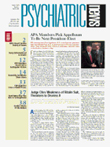As the old saying goes, “You can’t keep a good guy down.” The saying might well apply to the century-old diagnostic-therapeutic methodology of psychoanalysis as it makes a strong comeback.
For instance, some psychoanalysts are fighting tooth and nail to preserve psychoanalysis by lobbying on Capitol Hill and hiring public relations experts (Psychiatric News, January 19). Other analysts are infusing fresh blood into psychoanalysis by bringing it and neuroscience together (Psychiatric News, September 1, 2000; March 2). And now, perhaps for the first time in the history of psychoanalysis, two analytic groups that split from each other are reunifying.
They are the Philadelphia Association for Psychoanalysis and the Philadelphia Psychoanalytic Institute and Society. They have voted to merge, healing the split that occurred in 1949, when the “Association” broke away from the “Society.” The new joint organization will be called the Psychoanalytic Center of Philadelphia. The merger is expected to become official sometime this month. The organization will be led by copresidents Edward Hicks, M.D., (from the Philadelphia Psychoanalytic Institute and Society) and Stephen Risen, M.D. (from the Philadelphia Association for Psychoanalysis).
Cause of Split
When asked what caused the split back in 1949, Hicks replied: “The main reason had to do with differences over liberalism versus conservatism in their doctrines, their theories, and their ideas about how to practice. And some people viewed others as being a little too open minded or willing to include variations in their techniques. And in turn the conservative people were seen as much too rigid. But on top of that, there were personality differences, people who just couldn’t get along with each other. So they had angry battles and went off in different directions—and there was a fair amount of that in the psychoanalytic world. Nowadays, the thing that is more interesting about it is that, you might say, the liberalism won out. There have been so many new discoveries and extensions of psychoanalytic theory from the dogma of Sigmund Freud that now the general body of knowledge includes a wide diversity of approaches, and the psychoanalytic world is trying to join hands rather than fight against each other.”
APA President Daniel Borenstein, M.D., praised the reunification: “Mergers of this sort are extremely helpful. . . . The merged entities pool their human capital and financial resources, enabling them to participate more effectively in important community and government relations activities.”
Otto Kernberg, M.D., president of the International Psychoanalytical Association, likewise had positive words about the reunification: “[It] signals a new spirit of openness to alternative ways of conceptualizing educational, professional, and scientific issues. [It is] an expression of renewed strength and initiative within our psychoanalytic community.”
Commented Harold Blum, M.D., of Roslyn Estates, N.Y., a member of the American Psychoanalytic Association and executive director of the Sigmund Freud Archives: “This is a truly historic event. It shows that psychoanalysts are able to use analytic insights to help heal old wounds and grievances not only with patients, but also between groups. It demonstrates the effectiveness of contemporary psychoanalysis in helping to master trauma and stop the transmission of difficulties from one generation to another.”
Reason for ‘Remarriage’
The major reason the “divorced” Philadelphia analytic groups have decided on “remarriage” is that Philadelphia analysts have come to believe—as Borenstein pointed out—that they will be able to accomplish more by pooling resources and working together than they would be able to do on their own. For example, they have established in recent years numerous programs that make psychoanalytic ideas and training more readily available to a wide variety of individuals and groups in the Philadelphia community. These efforts include advanced training for therapists of children, adolescents, and adults, an enhanced clinical consultation and referral service, programs to educate day care workers and school counselors, liaisons with lawyers and judges working in family court, programs for immigrants from South Asian countries, and programs with the University of Pennsylvania and Haverford College that highlight the cultural contributions of psychoanalysis.
Philadelphia analysts hope that reunification will provide added energy for the expansion of all these programs, as well as for initiatives yet to come.
An important additional component of the merger will be the ability to enhance the teaching of psychoanalysis to all of the candidates and students. A new, creative psychoanalytic curriculum has been developed that should prove stimulating to both students and faculty. ▪
